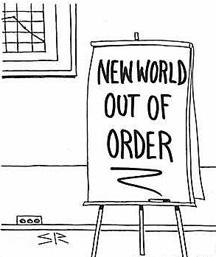
The U.S. at the head of the western powers tries as much as possible to hold onto some aspects of the unipolar status that it gained after the fall of the Soviet Union in 1991. In a period less than a decade, American ideologues head-mastered by groups of cold warriors angrily rejected any idea of a multi- polar world, declaring that no other country except the U.S. is qualified to be at the head of the “new world order.” This claim went unchallenged until the U.S. occupation of Iraq exposed the vulnerabilities of the U.S. as a single superpower on the world stage.
Today, after the U.S.-hatched quagmires in Iraq, Afghanistan and now Pakistan, to say nothing of Palestine, and in the eye of an economic hurricane, that claim sounds like an expression of idiocy. During the last decade of the 20th century there were “moments” that the U.S. administration prided itself on having achieved the unipolar status and those moments coincided with U.S. military attacks on other countries, specifically Iraq, Yugoslavia, Haiti, and threats against North Korea and Iran.
Today even the most power hungry strata within the American ruling class, including the Republican Party and a right-wing faction of the Democrats, admit that the future belongs to a multi-polar world order. The question is how fast at this juncture the world economic crisis, whose focal points are in the U.S. and Britain, would accelerate the trend of diminishing economic and consequently military power of the U.S. and Europe?
According to the most recent forecast by the U.S. National Intelligence Council (NIC), Global Trends 2025, by mid 20’s “the international system will be a global multi-polar one with disparity in national power continuing to narrow between developed and developing countries.”
With little ambiguity, the intelligence report reveals that “owing to the rise of emerging powers, a globalizing economy, an historic transfer of relative wealth and economic power from west to east, and the growing influence of non-state actors…the international system- as constructed following the Second World War – will be almost unrecognizable.”
In a report cited this month in the Financial Times, the People’s Republic of China bypassed Germany in terms of the size of its Gross Domestic Product (GDP) and attained the rank of the world’s third largest economy, behind the U.S. and Japan. The report also forecasted that within a period less than a decade, China will overtake Japan in terms of purchasing power parity.
By all indications, the current financial and economic crisis will intensify the woes resulting from U.S. economic stagnation and magnify the ever-increasing size of the U.S. debt to the rest of the world. “The financial and economic crash of 2008, the worst in over 75 years, is a major geopolitical setback for the U.S. and Europe,” says Roger C. Altman in the most recent issue of Foreign Affairs magazine. “Over the medium term, Washington and European governments will have neither the resources nor the economic credibility to play the role in global affairs that they otherwise would have played.”
The inadequacy of the NIC forecast is that it was prepared well before the full force and devastating impacts of the current crisis of the economy became apparent. Therefore, the forecast mainly considers the Western economies and geopolitical descent as a long drawn-out and extended process. By focusing only on the BRIC countries – Brazil, Russia, India, and China – the NIC forecast concludes that it will take them another 30-35 years before they could collectively match the wealth of the present Group of Seven industrialized countries of the U.S., Britain, Japan, Germany, France, Italy and Spain.
The most probable case would be that many oppressed and strangulated nations and countries under the present world order would join hands within or outside of the BRIC to establish new trade pacts, capital investment cooperatives, and even security alliances well before 2040-2045, as the forecast predicts. By now, after a decade of wars, it is brilliantly clear that the overwhelming majority of humanity across the globe cannot wait to see that the U.S.-imposed mono-polar world order is left behind us and a new, much more humane and inclusive system rises out of the ashes of the old.






